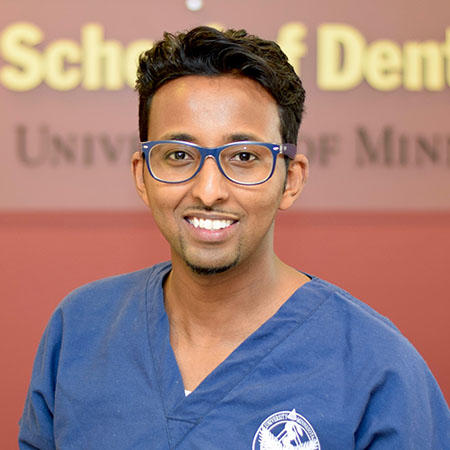Graduating dental student Elmi Ibrahim reflects on why he is driven to serve

For young Elmi Ibrahim, the sprawling refugee camp in the Kenyan desert where he spent eight years of his childhood was his entire world. After his father was killed in the civil war in their home country of Somalia, his mother fled to Kenya with Ibrahim and his four siblings.
“As a child, it all seemed normal,” says the fourth-year dental student. “There was no school, and we could not leave the camp. It was all I knew. So my memory is of playing outside with a lot of other children every day. My mom sheltered us from the threats around us; the violence, the gangs, the disease outbreaks of malaria, hepatitis, cholera and HIV.”
At age 10, Ibrahim was plagued by an infected molar that kept him awake at night. His mother was skeptical of the self-appointed witch doctors who offered to cut the tooth out without pain medication using non-sterile instruments. She had seen too many crude procedures end badly. With no professional oral health care available at the camp, Ibrahim suffered for a full year before the family was able to migrate to the United States.
FIRST ENCOUNTERS
His memories of those first few days in the U.S. are vivid. They resettled in Burnsville, Minn., where a church sponsored their first several months in the country. A volunteer took them immediately to the University of Minnesota Dental Clinics where Ibrahim remembers feeling the pain dissipate instantly, for the first time, with Novocain.
“It was such a relief I cannot even describe it,” he said. “I lost the tooth, I knew no English, but it was my first dental visit and it was positive.”
Ibrahim clearly remembers the volunteers who helped his family.
“They took us everywhere and taught us so much,” he said. “They taught us how to use the microwave, go grocery shopping, get to school and do laundry. The concept of volunteerism was new to me and I was amazed by this idea that kind people were helping us without getting paid. This has really stayed with me.”
Ibrahim learned English quickly, excelled in school, completed a Bachelor of Science degree in medical laboratory sciences from the University of North Dakota and worked in a lab at the University of Minnesota for four years before applying to dental school.
ORAL HEALTH CARE IN THE SOMALI COMMUNITY
As a dental student and father, he carves out time to volunteer to improve the oral health of underserved communities, and in particular, the more than 100,000 Somali Americans living in the Twin Cities.
Recognizing the Somali community’s distrust of the American health care system, Ibrahim worked with Professor Nelson Rhodus, DMD, MPH, and fellow students to offer free oral cancer screenings at Mosques, apartment buildings and a Somali mall. He says the community was initially skeptical, but once they realized they were not selling anything, and that he and other Somali students spoke their language, they began to trust the screenings.
Ibrahim says he has learned that the prevalence of khat, a stimulant chewed predominantly by Somali men, and Hookah, smoked by many Somali youth, put them at greater risk for oral cancer.
“The Somali community is very tight knit,” he says. “They get advice from each other, and the advice is not always sound. For example, if someone dies at a specific hospital, the whole community will avoid that hospital. I want to break that cycle of relying on resources and information that is not factual or scientifically proven.”
Ibrahim credits Professor Nelson Rhodus for making the outreach possible and removing barriers at many levels.
“We look for cancer first, but we find a lot of periodontal disease, tooth pain, poorly-fitted and old prosthetic teeth,” said Ibrahim. “It is an excellent opportunity to educate and encourage better hygiene.”
Ibrahim served as president of the local Student National Dental Association, which promotes oral health equity among people of color. The organization’s membership grew ten-fold under his two-years as president as he empowered fellow students to develop outreach programs into their own communities.
A FUTURE OF SERVICE
Ibrahim will begin a general practice residency at Hennepin County Medical Center after graduating this spring, where he hopes to gain experience treating medically complex patients. He plans to one day open a practice with his sister, where they will see any patient who walks in the door.
Now, when he recalls his years in the Kakuma refugee camp in Kenya, he often thinks about his own two children, ages 4 years and 6 months, and how different their lives will be.
 “I want them to realize how fortunate they are to be born here,” says Ibrahim. “Life isn’t only about looking out for yourself and your family. You always have to ask yourself how you are giving back.”
“I want them to realize how fortunate they are to be born here,” says Ibrahim. “Life isn’t only about looking out for yourself and your family. You always have to ask yourself how you are giving back.”
Ibrahim traveled to Guatemala early in 2020 with faculty and other fourth-year students from the School of Dentistry to gain a greater understanding of how to effectively partner with community organizations to advance their health goals.
It pained Ibrahim to learn last year that only recently have professional oral health care services been brought to the more than 160,000 residents of Kakuma.
“I had hoped, all this time, that things had improved with health care there,” he said. “I have been gone for 20 years and am learning that only recently are dentists going to the camp. I would like to be one of them someday.”